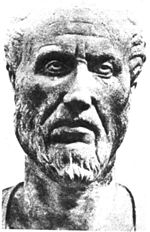 Neoplatonism is a strand of Platonic philosophy that emerged in the third century AD against the background of Hellenistic philosophy and religion.The term does not encapsulate a set of ideas as much as it encapsulates a chain of thinkers which began with Ammonius Saccas and his student Plotinus (c. 204/5 – 270 AD) and which stretches to the sixth century AD. Even though neoplatonism primarily circumscribes the thinkers who are now labeled Neoplatonists and not their ideas, there are some ideas that are common to neoplatonic systems, for example, the monistic idea that all of reality can be derived from a single principle, "the One".
Neoplatonism is a strand of Platonic philosophy that emerged in the third century AD against the background of Hellenistic philosophy and religion.The term does not encapsulate a set of ideas as much as it encapsulates a chain of thinkers which began with Ammonius Saccas and his student Plotinus (c. 204/5 – 270 AD) and which stretches to the sixth century AD. Even though neoplatonism primarily circumscribes the thinkers who are now labeled Neoplatonists and not their ideas, there are some ideas that are common to neoplatonic systems, for example, the monistic idea that all of reality can be derived from a single principle, "the One".The original Being initially emanates, or throws out, the nous, which is a perfect image of the One and the archetype of all existing things. It is simultaneously both being and thought, idea and ideal world. As image, the nous corresponds perfectly to the One, but as derivative, it is entirely different. What Plotinus understands by the nous is the highest sphere accessible to the human mind, while also being pure intellect itself. Nous is the most critical component of idealism, Neoplatonism being a pure form of idealism.The demiurge (the nous) is the energy, or ergon (does the work), which manifests or organises the material world into perceivability. (1)
The original creative or expressive act of the One is the first great derived reality, nous (which can be only rather inadequately translated as “Intellect” or “Spirit”); from this again comes Soul, which forms, orders, and maintains in being the material universe. It must be remembered that, to Plotinus, the whole process of generation is timeless; Nous and Soul are eternal, while time is the life of Soul as active in the physical world, and there never was a time when the material universe did not exist. The “levels of being,” then, though distinct, are not separate but are all intimately present everywhere and in everyone. To ascend from Soul through Intellect to the One is not to travel in space but to awake to a new kind of awareness. (2)
A living beings, and human beings in particular, consciousness is but one psychic activity among others. The realm of the psychic extends in a continuum from the loftiest processes of knowing, memory, and imagination down to the most rudimentary forms and expressions of life that characterize the world’s biosphere (natural processes of metabolism, growth, etc.). Many influential ancient thinkers, both philosophers and poets, regarded the universe as a living being, not only in its parts but also and especially as whole. In the Timaeus, Plato had described in detail the structure and function of the world soul, and had recounted the way in which it was put together by a divine craftsman (demiurge) and conjoined with the realm of disorderly matter, upon which it controlled and imposed order. Plotinus and his followers had a quite different view. There is no planning on account of anyone, no “construction” of one metaphysical entity by another; instead, soul, that is to say the general phenomenon of life capable of animating matter, is merely the manifest outer aspect of the inner activity of Consciousness.|
For the Neoplatonists, “Nature” denotes not only the essence or nature of each natural being or the entirety of the natural world (Nature as a whole), but also, and in the first instance, a lower aspect of conscious life (the “autonomic” life activities that are not consciously controlled by the individual animal’s consciousness) which beholds, in a kind of diminished vision, relevant aspects of the intelligible world and brings them forth in an act of silent contemplation. (3)
References:
1. https://en.wikipedia.org/wiki/Neoplatonism
2. https://www.britannica.com/topic/Platonism/Plotinus-and-his-philosophy
3. https://plato.stanford.edu/entries/neoplatonism/#SouNat

No comments:
Post a Comment